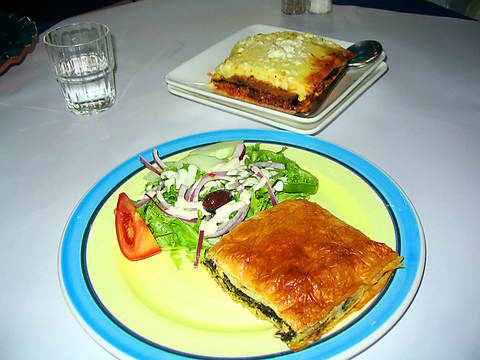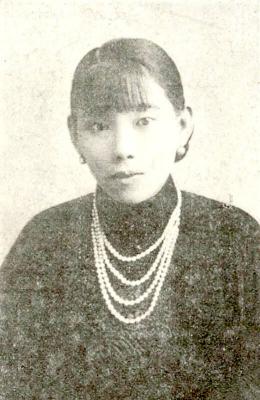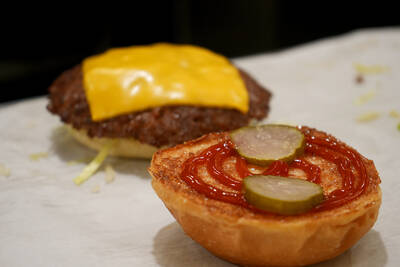Mykonos, in the middle of the Aegean Sea, is one of the most popular of the Greek isles. It is also the namesake of one of Taipei's favorite foreign eateries, which reopened in its fourth
incarnation just a few months ago.
I'm happy to be able to report that Mykonos has made the move from Lishui Street to Siwei Road (just off of Da'an Road above Xinyi Road) without losing any of its key ingredients -- good food and ambiance.

PHOTO: DIANE BAKER, TAIPEI TIMES
When Mike Waldorf and his partner Gino Lin decided to open a restaurant in Taipei more than a decade ago, Waldorf decided to feature Greek food because of the interest he had developed in it years before when he worked on the big cruise liners plying the Mediterranean.
From the beginning, Mykonos' whitewashed walls and blue trim evoked postcard images of sun-drenched seaside villages. The music of Nana Mouskouri and Greek instrumentals in the background also helped.
A good way to start off a meal with friends at Mykonos is by choosing the combination meza plate, which offers a sampling of some of the cafe's appetizers -- hummus, tzaziki, feta cheese and greek olives, yogurt and an eggplant dip -- served with slices of pita bread, all for NT$400. Individual choices for appetizers range from NT$220 to NT$280 and include marinated mushrooms, taramasalata and htipiti, which is a spicy feta cheese spread.
Favorite entrees for my friends include kotopoulo psito, which is half a roast chicken, for NT$530 and grilled salmon for NT$520. The entree sets are good value as they include soup, salad and coffee or tea. Other favorites are gyro pita, slices of roasted lamb served on pita bread, which is NT$350, as is the moussaka, a crustless pie combining minced lamb, thin slices of eggplant, tomatoes and spices.
A friend and I couldn't decide between the spanakotiropita, the cheese and spinach pie, or the meatless version of the moussaka, which is made from eggplant, rice, thin slices of potatoes, raisins, pine nuts and spices. So we decided to order both and split them. The spanakotiropita was just as delicious as we had remembered from visits to Mykonos versions I, II and III, but the generous serving of the veggie moussaka was more than we could handle.
If only the sea were right outside the cafe, life would be perfect. As it is, Mykonos is a pleasant oasis in the urban roar of Taipei.

Many people noticed the flood of pro-China propaganda across a number of venues in recent weeks that looks like a coordinated assault on US Taiwan policy. It does look like an effort intended to influence the US before the meeting between US President Donald Trump and Chinese dictator Xi Jinping (習近平) over the weekend. Jennifer Kavanagh’s piece in the New York Times in September appears to be the opening strike of the current campaign. She followed up last week in the Lowy Interpreter, blaming the US for causing the PRC to escalate in the Philippines and Taiwan, saying that as

This year’s Miss Universe in Thailand has been marred by ugly drama, with allegations of an insult to a beauty queen’s intellect, a walkout by pageant contestants and a tearful tantrum by the host. More than 120 women from across the world have gathered in Thailand, vying to be crowned Miss Universe in a contest considered one of the “big four” of global beauty pageants. But the runup has been dominated by the off-stage antics of the coiffed contestants and their Thai hosts, escalating into a feminist firestorm drawing the attention of Mexico’s president. On Tuesday, Mexican delegate Fatima Bosch staged a

Nov. 3 to Nov. 9 In 1925, 18-year-old Huang Chin-chuan (黃金川) penned the following words: “When will the day of women’s equal rights arrive, so that my talents won’t drift away in the eastern stream?” These were the closing lines to her poem “Female Student” (女學生), which expressed her unwillingness to be confined to traditional female roles and her desire to study and explore the world. Born to a wealthy family on Nov. 5, 1907, Huang was able to study in Japan — a rare privilege for women in her time — and even made a name for herself in the

Taiwan can often feel woefully behind on global trends, from fashion to food, and influences can sometimes feel like the last on the metaphorical bandwagon. In the West, suddenly every burger is being smashed and honey has become “hot” and we’re all drinking orange wine. But it took a good while for a smash burger in Taipei to come across my radar. For the uninitiated, a smash burger is, well, a normal burger patty but smashed flat. Originally, I didn’t understand. Surely the best part of a burger is the thick patty with all the juiciness of the beef, the